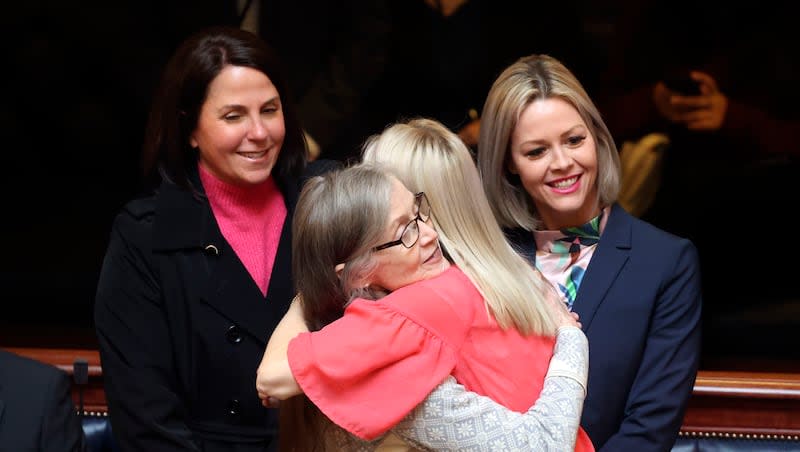Opinion: What passing legislation and the sport of curling have in common

It’s impossible to get anything done in government.
This is a sentiment you’ve probably heard many times before, and as culture wars rage, bipartisan efforts become increasingly rare and public trust in institutions erodes, it’s easy to lose faith in legislative solutions, or feel that policy is no longer the vehicle for change that it once was.
Yet over the last three legislative sessions, we at The Policy Project have had three successes: In 2022, the unanimous passage of HB162, “Period Products in Schools”; in 2023, a $15 million appropriation to create teen centers that provide resources for students and families in need; and now, SB205, “Child Sexual Abuse Prevention Amendments,” a bill that provides funding and the opportunity for all of Utah’s elementary students to receive age-appropriate child abuse prevention training at school. SB205 just passed in the 2024 Utah Legislature session with unanimous votes.
We are frequently asked how we are able to have bills pass so “easily,” and whether our success comes from tackling “small” policy changes. But in the current climate, there are no “easy” bills, and some of those “small” policy changes, when they address the root cause of an issue, create major change. The truth is that it’s not easy, and it only looks that way until you zoom out and see the larger picture. A metaphor I like to use to explain our process is the sport of curling.
Yes, curling. The sport you probably only hear about during winter Olympic years, where players slide stones across sheets of ice toward a target. That curling.
In curling, there’s a player that delivers the stone, but there are also team members ahead of that stone, smoothing its path and directing it where it needs to go. They furiously sweep, sweep, sweep to make sure the stone can smoothly and effortlessly hit the target. With everyone working together, the stone glides at a perfect speed and direction, hitting its bullseye.
This year’s bill (or stone) was SB205, and we had a massive team of sweepers. We knew that consensus bills, or bills that had been studied and worked on by a diverse group of stakeholders prior to the legislative session, have the greatest chance of passing. We took the temperature of the ice and began to gather and evaluate feedback regarding the language of the bill. We met with supporters of our bill, but most importantly, with those who challenged our ideas. We listened to experts on child abuse, developers of prevention curriculum, members of law enforcement, local superintendents, state school board members, county attorneys, those who received abused children at several of Utah’s Children’s Justice Centers and many others. We shared our findings with skeptics and those who were publicly opposed to mandates for abuse prevention education. We met with legislators who were willing to champion the bill and work with their colleagues to find acceptable language and compromises. We continued meeting one-on-one with legislators, helping them understand the need for abuse prevention and securing their support.
We also prepared the ice sheet with grassroots community work. Hosting training events around Utah, we introduced parents and educators to a sample curriculum, and reassured fears they might have had that this was “sex ed” or contained sexual content. We had local figures as varied as victim advocate Elizabeth Smart and House Speaker Mike Schultz, R-Hooper, and his wife, Melissa, speak to the importance of abuse education for Utah families.
Both conservative and progressive voices were needed, and we reached out to both, and they reached out to their audiences. Via social media, we reached out to communities across the state and used our Community Champions to spread the message. Thousands of involved citizens wrote and called their representatives to make sure they knew that this bill needed to be passed.
We’re not denying that it is difficult to find consensus on important public policies. But preparing and working before the bill was even drafted, and including all stakeholders in the process, smoothed the path. We had a team spread across the ice, each member sweeping and playing an integral role in making sure our stone — SB205 — hit its target.

Mary Catherine Perry is the director of policy and government affairs at The Policy Project, a nonprofit that promotes solution-based policies to remove barriers to opportunity for women, children and families in Utah. The Policy Project’s major campaigns include The Utah Period Project, The Teen Center Project and The Safe Child Project. Perry and her husband and four children reside in Salt Lake City.

